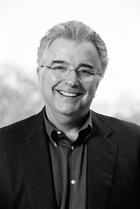
For Samuel Popkin, 2008 is more than just a leap year—it's an election year. And if there's one area of politics that particularly interests him, it's what unfolds during political campaigns, especially presidential campaigns.
"Campaigns are a critical juncture of mobilization and policy," he explains. "You fight about the direction the party should go in the primary and you defend your record or offer alternatives. Then you run a gauntlet where you and your ideas are tested."
He adds: "It's the fastest show on earth and I'm fascinated by the combination of bread and circuses it requires to assemble a coalition that gets you to fifty percent."
It's this fascination that has led the UCSD Political Science professor to focus much of his research over the last 40 years on voting behavior and public opinion in political campaigns. Popkin has published numerous articles, papers and books on the topic, and is planning on writing a new book focusing on campaign decision making and strategy since World War II.
"I want to write about political campaigns the way historians write about military history," he says. "I want to look at the kind of mistakes that were made and analyze them."
According to Popkin, this is something that has never been done by campaigners.
"The minute one campaign stops, planning for the next one begins," he explains. "The people involved are so busy strategizing and reacting that they don't have time to think about what they did, they only have time to think about what they're going to do."
Popkin, on the other hand, has the opportunity and the expertise to analyze patterns. In addition to his extensive research on the subject, he's also served as a consulting analyst in presidential campaigns, including the Clinton campaign and most recently, the Gore campaign. He also consulted with CBS News election units on polling and strategy from 1983-1990 and has served as a consultant to political parties in Canada, Europe and Asia, and to the U.S. Departments of State and Defense.
Popkin's interest in campaigns and politics began when he was an undergrad at MIT during the Kennedy administration. Although he majored in Mathematics, he took numerous political science courses and ultimately decided to get his Ph.D. in Political Science from MIT. It was a decision, he says, that was influenced by the air of social activism at the time.
"I'd always been interested in math, psychology and economics, but when I was in college, there was this feeling that the social sciences were the 'new frontier' and you could help the world. That had an effect on me."
After receiving his Ph.D., Popkin went on to work as an assistant professor at Harvard University where he began research in comparative politics and peasant society, with a focus on East and Southeast Asia. After leaving Harvard, he joined the faculty at University of Texas, Austin, before coming to UCSD in 1975 as an associate professor of Political Science. Not intending to stay for very long, Popkin instead found himself caught up in the energy and excitement of a young department and university.
"I really thought I'd be here for five or ten years and then move on, because that's just what you did," he says. "But when you spend so much time building up and working with such a fabulous group of students and colleagues, you find it's hard to go. And UCSD is such an exciting place; it's become a major world player in terms of its research impact. How could I leave?"
Indeed, Popkin seems to find that air of excitement hard to leave, be it at the university or in politics. When asked about any potential involvement in next year's presidential race, Popkin hedges his bets.
"I keep saying I've had my last 'last campaign', but that may not be the case," he says. "I guess we'll have to wait and see."
|